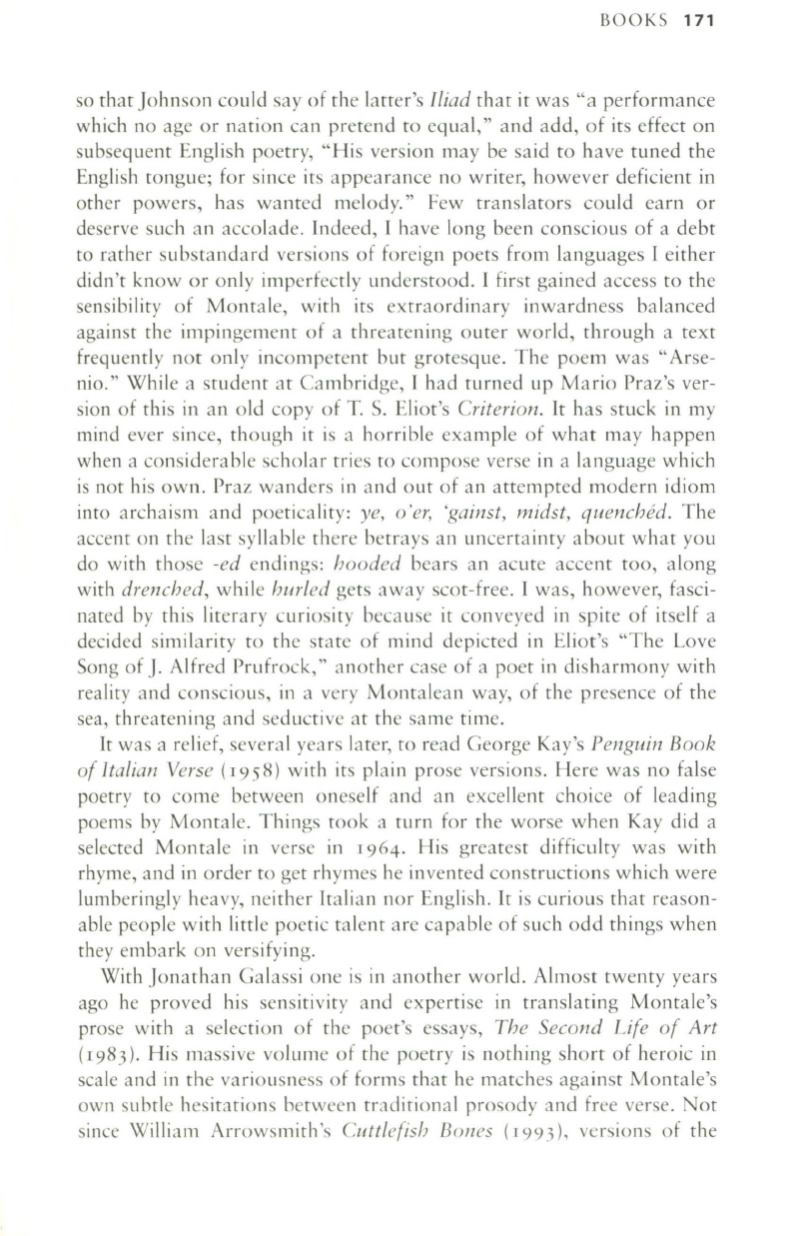
BOOKS
171
so that Johnson could say of the latter's
lIiad
that it was "a performance
which no age or nation can pretend
to
equal," and add, of its effect on
subsequent English poetry, "His version may be said
to
have tuned the
English tongue; for since its appearance no writer, however deficient in
other powers, has wanted melody." Few translators could earn or
deserve such an accolade. Indeed, I have long been conscious of a debt
to rather substandard versions of foreign poets from languages [ either
didn't know or only imperfectly understood. I first gained access to the
sensibility of Montale, with its extraordinary inwardness balanced
against the impingement of a threatening outer world, through a text
frequently not only incompetent but grotesque. The poem was" Arse–
nio." While a student at Cambridge, I had turned up Mario Praz's ver–
sion of this in an old copy of
T.
S. Eliot's
Criterion.
It
has stuck in my
mind ever since, though it is a horrible example of what may happen
when a considerable scholar tries to compose verse in a language which
is not his own. Praz wanders in and out of an attempted modern idiom
into archaism and poeticality:
ye, o'er, 'gainst, midst, quenched.
The
accent on the last syllable there betrays an uncertainty about what you
do with those
-ed
endings:
hooded
bears an acute accent too, along
with
drenched,
while
hurled
gets away scot-free. I was, however, fasci–
nated by this literary curiosity because it conveyed in spite of itself a
decided similarity
to
the state of mind depicted in Eliot's "The Love
Song of J. Alfred Prufrock," another case of a poet in disharmony with
reality and conscious, in a very Montalean way, of the presence of the
sea, threatening and seductive at the same time.
It
was a relief, several years later, to read George Kay's
Penguin Book
of Italian Verse
(I958)
with its plain prose versions. Here was no false
poetry to come between oneself and an excellent choice of leading
poems by Montale. Things took a turn for the worse when Kay did a
selected Montale in verse in
1964.
His greatest difficulty was with
rhyme, and in order to get rhymes he invented constructions which were
lumberingly heavy, neither Italian nor English.
It
is curious that reason–
able people with little poetic talent are capable of such odd things when
they embark on versifying.
With Jonathan Galassi onc is in another world. Almost twenty years
ago he proved his sensitivity and expertise in translating Montale's
prose with a selection of the poet's essays,
The Second Life of Art
(I983).
His massive volume of the poetry is nothing short of heroic in
scale and in the variousness of forms that he matches against Montale's
own subtle hesitations between traditional prosody and free verse. Not
since William Arrowsmith's
Cuttlefish BOlles
(1993),
vcr<;ions of the


